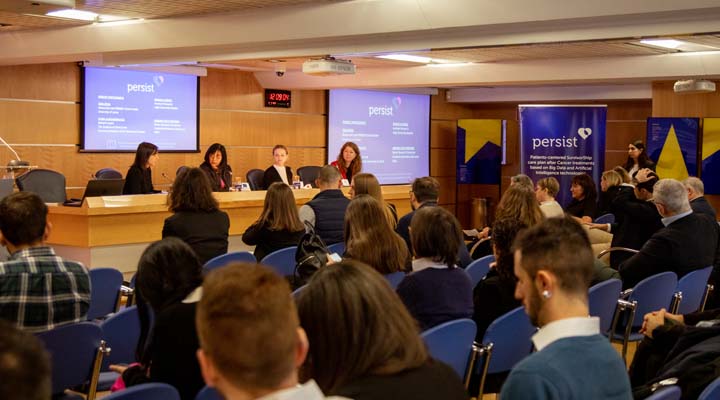
Three years of research with 4 European hospitals and 160 patients
The CHUO of Ourense, reference centre in Spain
Gradiant presented yesterday, February 15th, in Madrid its innovation that detects and predicts possible relapses in patients who have suffered colon and breast cancer. This predictive model based on artificial intelligence has been developed in the last three years and will present its clinical results in the coming days. The system has been developed by Gradiant as part of its collaboration in the PERSIST project, which aims to create a new model of care supported by various technological tools such as predictive models and web applications, among others. In it, the Galician technology centre collaborates with 13 other entities from 10 countries. Gradiant’s innovation is based on a technological innovation that allows to study images of liquid biopsies to detect circulating tumour cells.
The PERSIST project has been funded with 5 million euros by the European Union and has allowed clinical trials in 4 hospitals in Spain, Belgium, Slovenia and Latvia. A total of 160 cancer patients and 32 healthcare professionals have voluntarily collaborated in the trials. The University Hospital Centre of Ourense (CHUO) has been the reference centre in Spain.
Detecting tumour cells
One of the main advances and direct contribution of Gradiant has been the development of an Artificial Intelligence model that automatically detects circulating tumour cells in blood samples. This biomarker can help predict relapses in patients who have overcome a cancer, or metastasis in patients with an active cancer. Currently, this method is not used in routine practice due to the complexity involved in analysing the images under the microscope. A barrier that has been completely overcome thanks to the innovation developed at the technology centre in Vigo.
“The PERSIST project has allowed us to have a better understanding of the implications of cancer survival, both for the survivors themselves and for the health system and its professionals. It has also demonstrated how technology can support care models that put the patient at the centre, empower them to actively participate in the process, and allow better monitoring and definition of a personalised clinical strategy for each cancer survivor,” explained Alberto Sánchez, head of eHealth at Gradiant and coordinator of PERSIST, this morning.
Empowering patients
Based on artificial intelligence for the capture and standardisation of data for each patient, the system developed by PERSIST partners supports oncologists’ decision making for the early detection of cancer recurrence. In this way, professionals can personalise the therapeutic strategy and react early to any risk for the patient. The PERSIST objective is based on supporting the best follow-up and intervention strategy, empowering patients to participate in their own care and promoting their emotional health in the fight against the fear of relapse and of not being detected early in primary care or in follow-up with their oncologist.
The data capture of the PERSIST system includes the integration of data from each patient’s medical record, real-time data recorded by the patient via a mobile application and video and voice interaction with each patient.
PERSIST is a European project that started in 2020. Gradiant has coordinated all the research in which 13 entities from 10 countries have participated: Sergas and Dedalus (Spain); Univerza Mariboru and Univerzitetni Klinicni Center Maribor (Slovenia); Haute Ecole Specialisée De Suisse (Switzerland); Latvijas Universitate (Latvia); Cyberethics Lab (Italy); Centre Hospitalier Universitaire de Liège (Belgium); Symptoma (Austria); Rubynanomed (Portugal); National Patients’ Organization (Bulgaria); and Emoda (Turkey).
340 innovative projects in more than 30 countries
With a staff of over 150 employees and a turnover of 8.5 million euros in 2022, Gradiant has established itself as a benchmark in the national R&D&I system. Since 2007, Gradiant has concluded more than 340 projects. In addition, it has led directly from Galicia the conception and development of technological applications in collaboration with institutions, public or private, from more than 30 countries.

PERSIST has received funding from the European Union’s Horizon 2020 research and innovation programme under grant agreement No. 875406.


